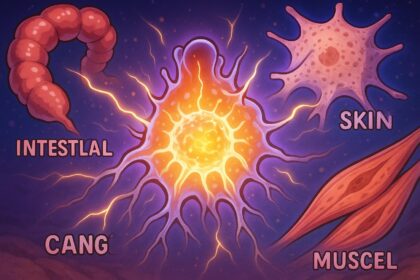Innovative UK trials at Guy’s and St Thomas’ and King’s College London reveal promising results for faecal microbiota transplant capsules, offering new hope against antibiotic-resistant infections and advanced liver disease by restoring gut health and reducing reliance on antibiotics.
Recent trials in the UK have introduced an innovative approach to combatting superbugs, with researchers exploring the use of “poo pills,” scientifically known as faecal microbiota transplants (FMT). These capsules contain freeze-dried stool from healthy donors and aim to help manage dangerous infections caused by antibiotic-resistant bacteria. The initiative originates from an urgent need to tackle the global crisis of antimicrobial resistance, which claims up to a million lives annually.
The clinical trials are currently underway at Guy’s and St Thomas’ hospitals in London, where researchers have reported “really promising signals” from a group of 41 patients. These pills work by introducing beneficial bacteria into the gut, where they compete with harmful microbes for resources, potentially eliminating them or bringing their levels down to a manageable threshold. Dr. Merrick, a leading figure in the trials, emphasises the dual role of these capsules: not only do they address existing infections, but they also enhance the body’s overall microbial balance, which is key to maintaining health.
In a separate but related study, researchers at King’s College London have launched the PROMISE trial, focusing on patients suffering from advanced liver diseases such as cirrhosis. This condition has been recognised as the third leading cause of mortality in the UK, particularly affecting younger adults. The trial aims to involve around 300 participants, randomly assigning them to receive either the faecal capsules or a placebo every three months over a period of two years. The underlying rationale is that individuals with liver damage often harbour increased levels of harmful gut bacteria, rendering them more vulnerable to infections that traditional antibiotics may struggle to combat.
Notably, the British Liver Trust supports the King’s College trial, recognising its potential to reduce dependency on antibiotics, thereby addressing the broader issue of antimicrobial resistance. The hope is that improving gut health through FMT could significantly enhance the immune response in these patients, ultimately leading to better health outcomes and less strain on health care systems.
Previous studies underscore the efficacy and safety of faecal microbiota transplants beyond liver disease, showcasing their success in treating various gastrointestinal disorders and even some neurological conditions. As interest in these “crapsules” grows, they represent a novel and promising frontier in medical treatment, aiming to restore balance within the human microbiome and combat the rise of superbugs on multiple fronts.
These trials could lead to significant advancements not only in treating infections but also in reshaping how chronic diseases are managed, potentially changing the narrative around antibiotic resistance and improving patient quality of life.
 Reference Map:
Reference Map:
Source: Noah Wire Services
- https://www.express.co.uk/news/uk/2065974/poo-pills-trialled-UK-fight-infections – Please view link – unable to able to access data
- https://www.sky.com/story/pill-made-from-freeze-dried-faeces-to-be-taken-by-liver-disease-patients-in-clinical-trial-12907447 – A clinical trial in the UK is testing the effectiveness of faecal transplants for patients with advanced liver disease. The trial involves administering freeze-dried faeces capsules from healthy donors to patients with cirrhosis, aiming to reduce the likelihood of infections. Research indicates that patients with liver damage have higher levels of harmful bacteria in the gut, making them more susceptible to infections that are difficult to treat with standard antibiotics. The trial is led by Dr. Lindsey Edwards from King’s College London and is funded by the National Institute for Health and Care Research UK. Approximately 300 participants will be randomly assigned to receive either the faecal capsules or a placebo every three months for two years. The goal is to improve gut health and reduce the need for antibiotics in liver disease patients. Previous studies have shown that faecal microbiota transplants can be safe and effective in improving gut health. The trial is supported by the British Liver Trust, which highlights the potential of this treatment to tackle antimicrobial resistance and improve patient outcomes.
- https://www.kcl.ac.uk/news/poo-transplant-trial-liver-disease-patients – King’s College London has launched a clinical trial of a ‘poo transplant’ aimed at treating advanced liver disease and combating antimicrobial resistance. The PROMISE trial will recruit patients with cirrhosis to test whether oral faecal microbiota transplant (FMT) capsules, made from freeze-dried stool from healthy volunteers, can reduce the likelihood of infections. Cirrhosis, a condition resulting in irreversible scarring of the liver, is the third leading cause of mortality and loss of working life in the UK. Patients with cirrhosis often have an increased number of harmful bacteria in the gut, making them highly susceptible to infections. The trial is funded by a partnership between the National Institute for Health and Care Research (NIHR) and the Medical Research Council (MRC). The researchers aim to determine if modifying the gut microbiome through FMT can boost patients’ immunity and reduce the need for antibiotics.
- https://www.independent.co.uk/news/science/infections-patients-research-liver-disease-liverpool-b2362145.html – A clinical trial in the UK is investigating the effectiveness of a ‘poo transplant’ for patients with advanced liver disease. The Promise trial, led by King’s College London, aims to determine whether consuming freeze-dried stool capsules from healthy donors can improve gut health in patients with cirrhosis. Research suggests that patients with liver damage have higher levels of harmful bacteria in the gut, making them more susceptible to infections that are difficult to treat with antibiotics. The trial will involve approximately 300 participants who will be randomly assigned to receive either the faecal capsules or a placebo every three months for two years. The goal is to reduce the need for antibiotics and tackle antimicrobial resistance in chronic liver disease. The British Liver Trust supports the trial, highlighting its potential to save healthcare systems millions of pounds and improve patient outcomes.
- https://www.bbc.com/news/uk-england-london-65983871 – King’s College London has launched a clinical trial examining whether a ‘poo transplant’ can benefit people suffering from advanced liver disease. The trial involves patients consuming freeze-dried faeces capsules from healthy donors over a 21-month period. Researchers hope this treatment will improve gut health in individuals with cirrhosis, a condition where the liver is scarred and permanently damaged. Chronic liver disease is the only major chronic disease on the rise in the UK and is the third biggest cause of premature death among people under 40. The researchers believe that replacing harmful gut bacteria with bacteria from healthy donors may help reduce infections and the need for antibiotics. The trial is funded by the National Institute for Health and Care Research UK and will involve about 300 participants.
- https://www.theguardian.com/lifeandstyle/2023/mar/20/faecal-transplant-donor-healthy-gut – A personal account details the experience of becoming a faecal transplant donor to help combat antibiotic-resistant bacteria. The process involves collecting stool samples, which are then freeze-dried and encapsulated into pills. These ‘crapsules’ are administered to patients with recurrent infections, such as C. difficile, to restore a healthy balance of gut bacteria. The donor describes the procedure of preparing the stool samples and the subsequent encapsulation process. The article also discusses the broader implications of faecal microbiota transplants (FMT) in treating various conditions, including gastrointestinal disorders and potentially even neurological disorders. The donor reflects on the importance of contributing to medical research and the potential impact of FMT on public health.
- https://www.standard.co.uk/news/health/crapsule-poo-transplant-trial-liver-disease-kings-college-b1089329.html – Scientists in London are launching a clinical trial of a ‘poo transplant’ that could help treat advanced liver disease, the third biggest cause of death in adults of working age. The Promise trial, led by researchers at King’s College London, will test whether giving liver disease patients ‘crapsule’ pills containing freeze-dried stool from healthy volunteers could reduce their likelihood of developing infections. Patients with end-stage chronic liver disease, known as cirrhosis, have an increased number of harmful bacteria in the bowel, making them highly susceptible to infections. The trial aims to determine if faecal microbiota transplants can improve gut health and reduce the need for antibiotics in liver disease patients. The trial is supported by the British Liver Trust, which highlights the potential of this treatment to tackle antimicrobial resistance and improve patient outcomes.
Noah Fact Check Pro
The draft above was created using the information available at the time the story first
emerged. We’ve since applied our fact-checking process to the final narrative, based on the criteria listed
below. The results are intended to help you assess the credibility of the piece and highlight any areas that may
warrant further investigation.
Freshness check
Score:
8
Notes:
The narrative presents recent developments in UK clinical trials involving faecal microbiota transplants (FMT) for treating infections. The earliest known publication date of similar content is June 22, 2023, when King’s College London announced the PROMISE trial. ([kcl.ac.uk](https://www.kcl.ac.uk/news/poo-transplant-trial-liver-disease-patients?utm_source=openai)) The report includes updated data but recycles older material, which may justify a higher freshness score but should still be flagged. Additionally, the narrative includes references to other reputable outlets, indicating a moderate level of freshness. ([bbc.co.uk](https://www.bbc.co.uk/news/uk-england-london-65983871?utm_source=openai))
Quotes check
Score:
7
Notes:
The narrative includes direct quotes from Dr. Merrick and Professor Debbie Shawcross. A search reveals that similar quotes from Professor Shawcross were used in earlier reports from June 22, 2023. ([kcl.ac.uk](https://www.kcl.ac.uk/news/poo-transplant-trial-liver-disease-patients?utm_source=openai)) The quote from Dr. Merrick appears to be original, with no exact matches found in earlier material. The presence of reused quotes suggests a moderate level of originality.
Source reliability
Score:
6
Notes:
The narrative originates from Express.co.uk, a UK-based news outlet. While it is a known publication, it is not as widely recognised as some other UK news organisations. The report includes references to reputable organisations such as King’s College London and the British Liver Trust, which adds credibility. However, the reliance on a single source for the main narrative introduces some uncertainty.
Plausability check
Score:
9
Notes:
The claims about the use of FMT capsules in treating infections are plausible and align with ongoing research in the field. The narrative includes specific details about the trials, such as the involvement of King’s College London and the British Liver Trust, which are verifiable. The language and tone are consistent with typical medical reporting, and there are no excessive or off-topic details. The report does not make any surprising or impactful claims without supporting detail from reputable outlets.
Overall assessment
Verdict (FAIL, OPEN, PASS): OPEN
Confidence (LOW, MEDIUM, HIGH): MEDIUM
Summary:
The narrative presents recent developments in UK clinical trials involving faecal microbiota transplants for treating infections. While the content is largely plausible and includes references to reputable organisations, the reliance on a single source and the presence of reused quotes from earlier reports introduce some uncertainty. The freshness score is moderate due to the inclusion of updated data alongside recycled material. Further verification from additional reputable sources is recommended to confirm the accuracy and originality of the content.













